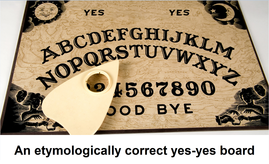|
Most of us know of the Ouija game, that macabre activity where children supposedly communicate with the dead. Annoyingly pronounced "wee-jee", it is actually a trademark of Hasbro, and it has a glaringly obvious etymology I never realized until now. Two words constitute it: oui, the French word for "yes", and ja, the German word for "yes". In effect, the Ouija board actually translate to a "yes-yes" board. This is possibly because of the "yes" tile on the board, or simply because it sounds mystical. Anyway, French oui is from Old French oil (pronounced oy-eel), which in turn is probably a mush of the Latin phrase hoc ille, meaning "so he" literally, but "yes" figuratively. Ja had no change through Middle German, Old High German, and Proto-Germanic, but in Proto-Indo-European it was ye, meaning "already". Of course, this is connected to our word "yes". There are other theories as to the origin of Ouija, such as that the inventors of the board first spelled out that word, and that it's Egyptian for "good luck", but those hypotheses are unfounded.
0 Comments
Your comment will be posted after it is approved.
Leave a Reply. |
AUTHORHello! I'm Adam Aleksic. I have a linguistics degree from Harvard University, where I co-founded the Harvard Undergraduate Linguistics Society and wrote my thesis on Serbo-Croatian language policy. In addition to etymology, I also really enjoy traveling, trivia, philosophy, board games, conlanging, and art history.
Archives
December 2023
TAGS |



